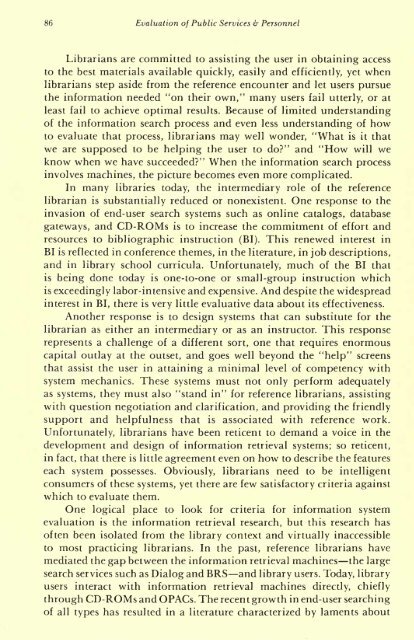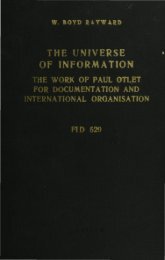User-Centered Evaluation of Information Retrieval - ideals
User-Centered Evaluation of Information Retrieval - ideals
User-Centered Evaluation of Information Retrieval - ideals
You also want an ePaper? Increase the reach of your titles
YUMPU automatically turns print PDFs into web optimized ePapers that Google loves.
86 <strong>Evaluation</strong> <strong>of</strong> Public Services fr Personnel<br />
Librarians are committed to assisting the user in obtaining access<br />
to the best materials available quickly, easily and efficiently, yet when<br />
librarians step aside from the reference encounter and let users pursue<br />
the information needed "on their own," many users fail utterly, or at<br />
least fail to achieve optimal results. Because <strong>of</strong> limited understanding<br />
<strong>of</strong> the information search process and even less understanding <strong>of</strong> how<br />
to evaluate that process, librarians may well wonder, "What is it that<br />
we are supposed to be helping the user to do?" and "How will we<br />
know when we have succeeded?" When the information search process<br />
involves machines, the picture becomes even more complicated.<br />
In many libraries today, the intermediary role <strong>of</strong> the reference<br />
librarian is substantially reduced or nonexistent. One response to the<br />
invasion <strong>of</strong> end-user search systems such as online catalogs, database<br />
to increase the commitment <strong>of</strong> effort and<br />
gateways, and CD-ROMs is<br />
resources to bibliographic instruction (BI). This renewed interest in<br />
BI is reflected in conference themes, in the literature, in job descriptions,<br />
and in library school curricula. Unfortunately, much <strong>of</strong> the BI that<br />
is being done today is one-to-one or small-group instruction which<br />
is exceedingly labor-intensive and expensive. And despite the widespread<br />
interest in BI, there is very little evaluative data about its effectiveness.<br />
Another response is to design systems that can substitute for the<br />
librarian as either an intermediary or as an instructor. This response<br />
represents a challenge <strong>of</strong> a different sort, one that requires enormous<br />
capital outlay at the outset, and goes well beyond the "help" screens<br />
that assist the user in attaining a minimal level <strong>of</strong> competency with<br />
system mechanics. These systems must not only perform adequately<br />
as systems, they must also "stand in" for reference librarians, assisting<br />
with question negotiation and clarification, and providing the friendly<br />
support and helpfulness that is associated with reference work.<br />
Unfortunately, librarians have been reticent to demand a voice in the<br />
development and design <strong>of</strong> information retrieval systems; so reticent,<br />
in fact, that there is little agreement even on how to describe the features<br />
each system possesses. Obviously, librarians need to be intelligent<br />
consumers <strong>of</strong> these systems, yet there are few satisfactory criteria against<br />
which to evaluate them.<br />
One logical place to look for criteria for information system<br />
evaluation is the information retrieval research, but this research has<br />
<strong>of</strong>ten been isolated from the library context and virtually inaccessible<br />
to most practicing librarians. In the past, reference librarians have<br />
mediated the gap between the information retrieval machines the large<br />
search services such as Dialog and BRS and library users. Today, library<br />
users interact with information retrieval machines directly, chiefly<br />
through CD-ROMs and OPACs. The recent growth in end-user searching<br />
<strong>of</strong> all types has resulted in a literature characterized by laments about
















